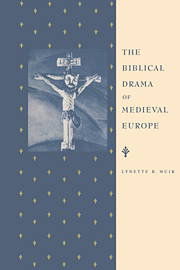Book contents
- Frontmatter
- Contents
- List of illustrations
- Preface
- Acknowledgements
- List of abbreviations
- Map 1 Medieval Europe showing locations of principal play-texts and records cited in this study
- Map 2 Enlargement of central area showing locations of liturgical and feast-day plays as defined in chapter 1
- Map 3 Enlargement of central area showing locations of civic and community plays as defined in chapter 2
- Introduction: Christian Europe and the Play of God
- PART ONE THE THEATRICAL COMMUNITY
- PART TWO THE THEATRICAL TEXT
- Conclusion: survival and revival
- Appendix: the liturgical context of the plays
- Notes
- Bibliographical index of plays
- Performance records and references
- General bibliography
- Index
Conclusion: survival and revival
Published online by Cambridge University Press: 18 September 2009
- Frontmatter
- Contents
- List of illustrations
- Preface
- Acknowledgements
- List of abbreviations
- Map 1 Medieval Europe showing locations of principal play-texts and records cited in this study
- Map 2 Enlargement of central area showing locations of liturgical and feast-day plays as defined in chapter 1
- Map 3 Enlargement of central area showing locations of civic and community plays as defined in chapter 2
- Introduction: Christian Europe and the Play of God
- PART ONE THE THEATRICAL COMMUNITY
- PART TWO THE THEATRICAL TEXT
- Conclusion: survival and revival
- Appendix: the liturgical context of the plays
- Notes
- Bibliographical index of plays
- Performance records and references
- General bibliography
- Index
Summary
THE AGE OF TRANSITION
In the sixteenth century, as in the twelfth, religious drama underwent a series of fundamental changes. The civic and liturgical plays which had existed side by side since the twelfth century continued to flourish but were now challenged by a new religious drama. A detailed analysis of these developments is beyond the scope of the present study and only a few examples can be given here of the polemical, historical, humanist and school drama which, combined with the development of the professional theatre, with its need to cater to the taste of the paying audience, eventually overwhelmed and replaced the essentially amateur and theocentric civic cycle and passion plays of medieval Europe.
Factors which militated against the continuation of the medieval tradition included religious reform, political change and the influence of classical humanism on literature and the arts; but neither Reformation theology nor renaissance humanism was directly the cause of the disappearance of the mysteries. The situation was more complex than that and varied considerably from one country to another.
Least influenced by the new developments was Spain. Apart from Catalonia, religious drama had only developed after the Reconquista, and the Peninsula had never had the strong independent civic drama of, for example, England or Germany.
- Type
- Chapter
- Information
- The Biblical Drama of Medieval Europe , pp. 158 - 170Publisher: Cambridge University PressPrint publication year: 1995



